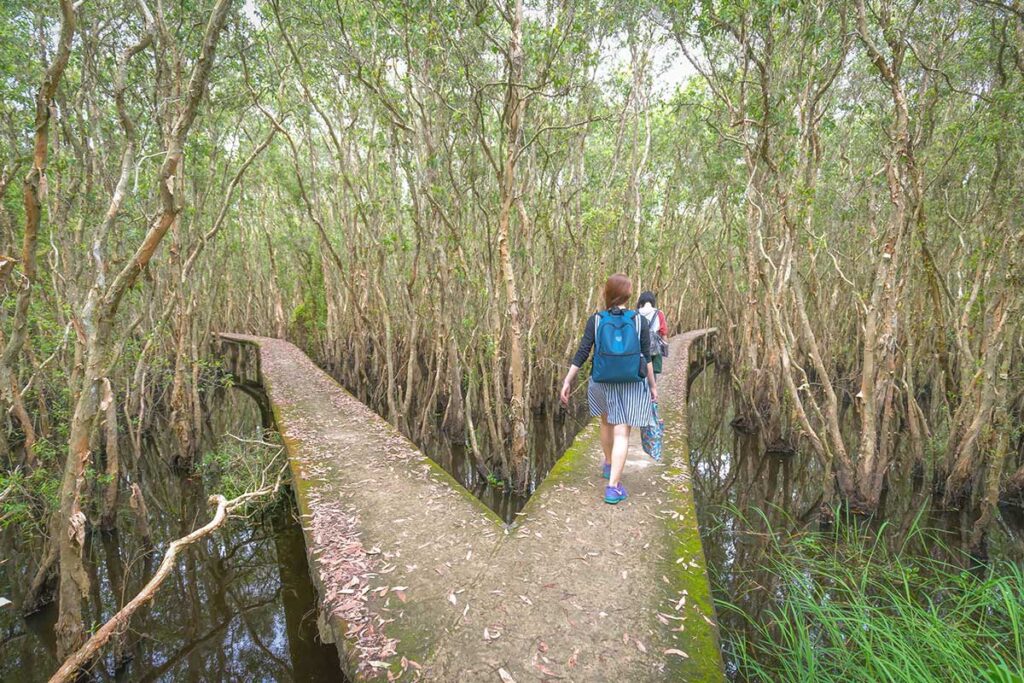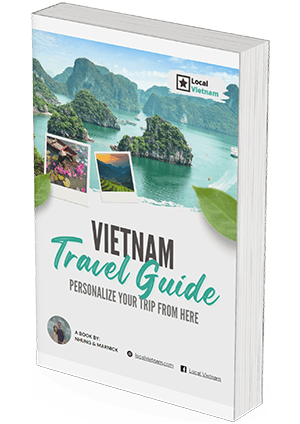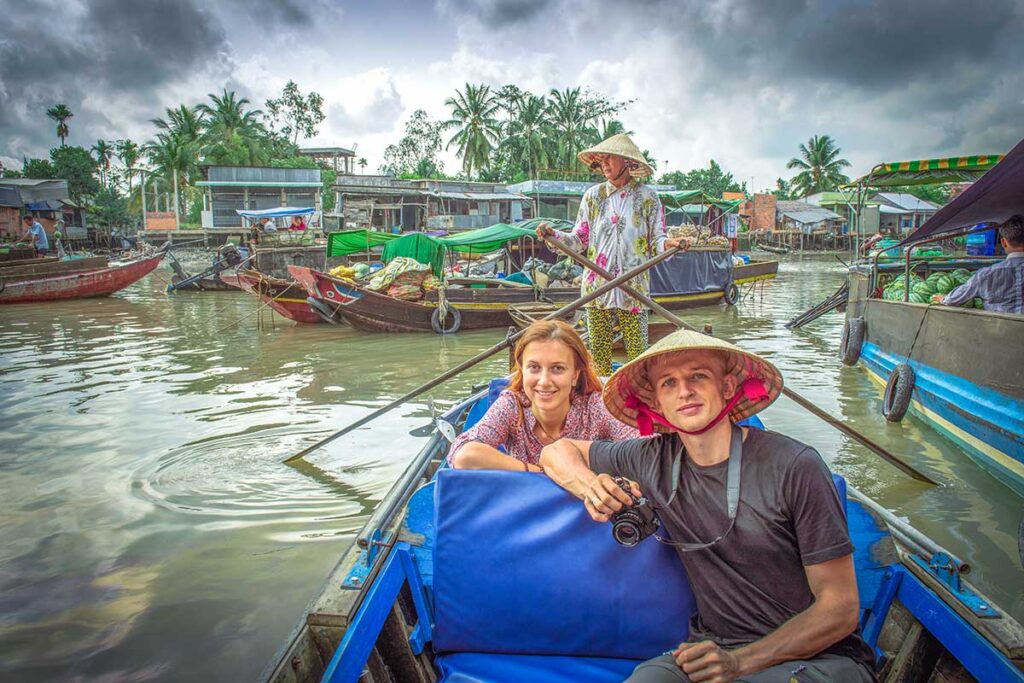What is Tan Lap Floating Village
Tan Lap Floating Village is a wetland reserve in Long An’s Đồng Tháp Mười (Plain of Reeds), built around melaleuca (cajuput) forest, narrow canals, and seasonal lotus and water-lily ponds. Despite the name, it isn’t a lived-in “floating village” today; it’s an eco-tourism area with boat routes, raised walkways, and a couple of watchtowers. The scenery changes with the water level—greener and more aquatic in the flood season, drier and more open the rest of the year. It’s pleasant and photogenic, but expect a managed park experience rather than wilderness or a cultural village.
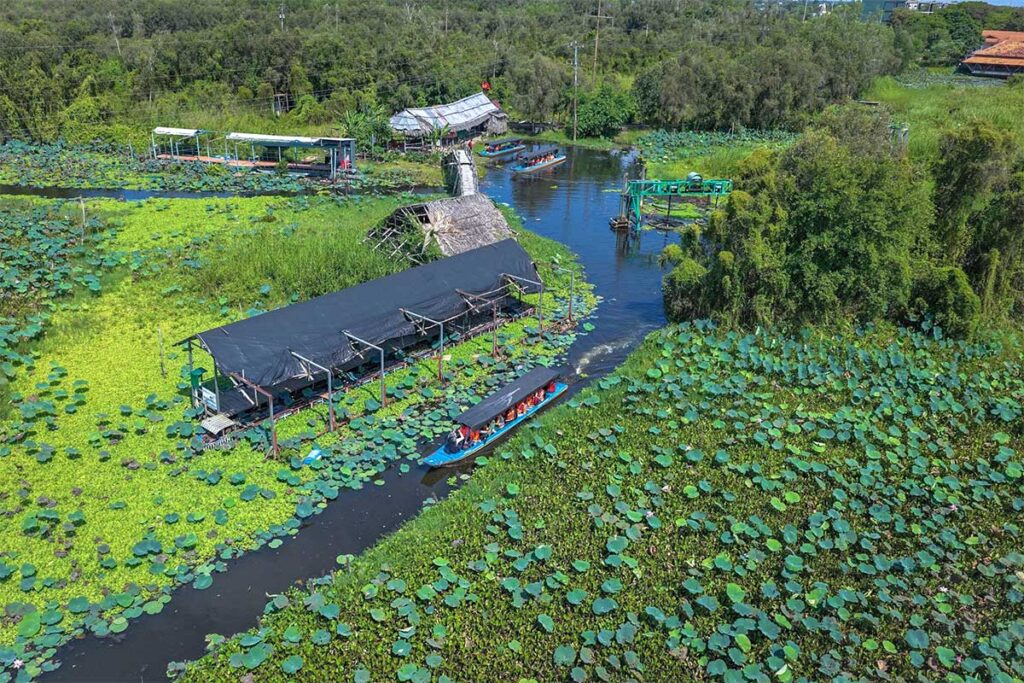
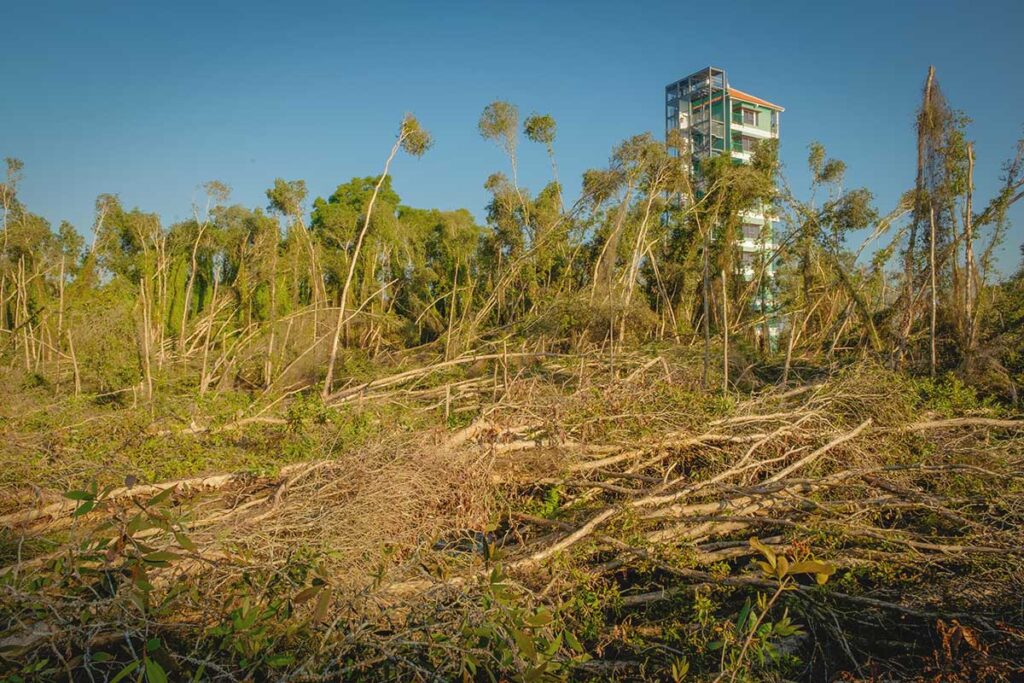
Geographically, it sits about 100–110 km from Ho Chi Minh City in Mộc Hóa District, Long An. The distance looks short on the map, but the drive often takes longer than you’d think (roughly 2.5–3.5 hours each way) because parts of National Highway 62 are slow. It’s doable as a day trip with an early start; just set expectations for a nature-focused outing with simple on-site services rather than a full Mekong Delta cultural program.
Things to do at Tan Lap Floating Village
This is a managed wetland park. Think gentle boat rides, easy walking, and a handful of photogenic viewpoints. It’s relaxing and nature-focused rather than a cultural “village.”
1. Canoe and boat experiences
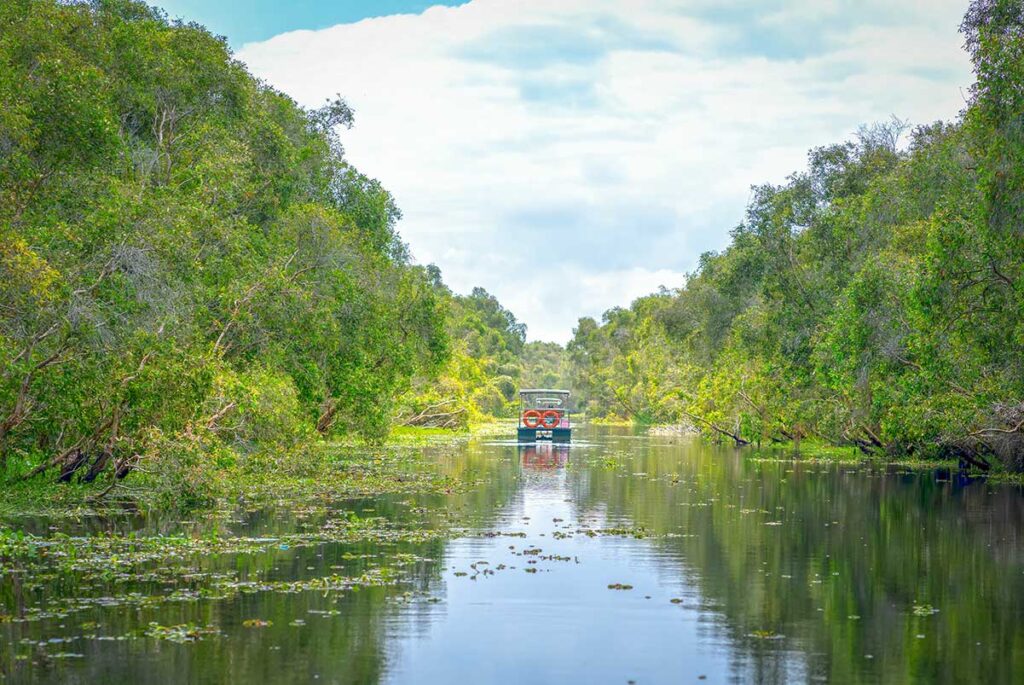
Rowed sampans slip through narrow canals under the melaleuca canopy; motorboats cover a wider loop with a bit more speed. On busy days you might also find a cable-pulled boat running a set route. You buy your entrance ticket first, then add a boat option at the pier—staff will point you to the right jetty.
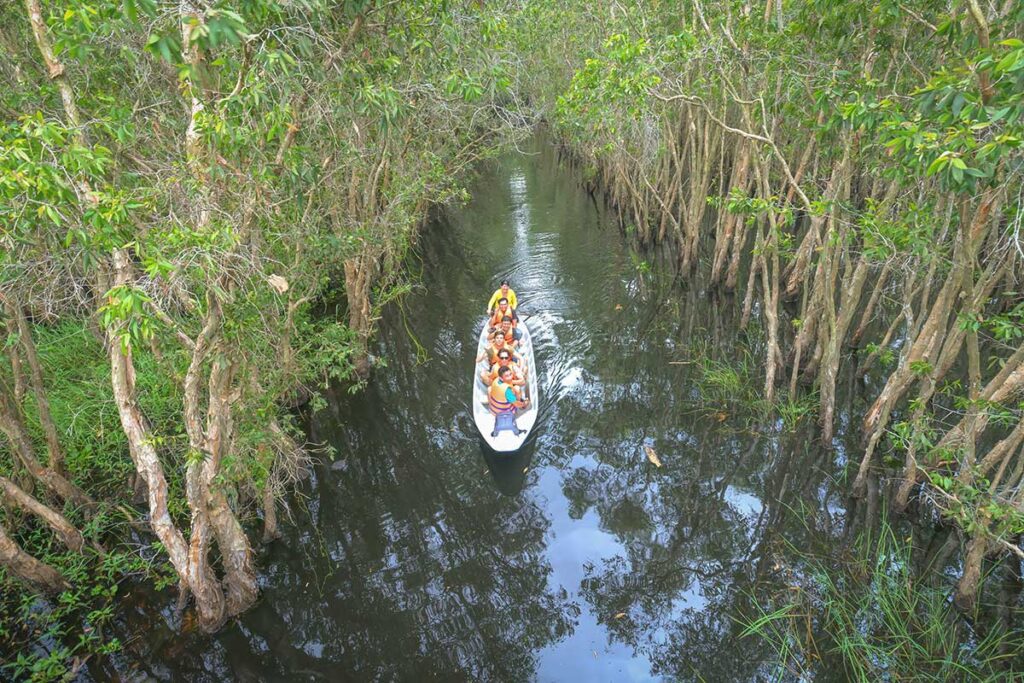
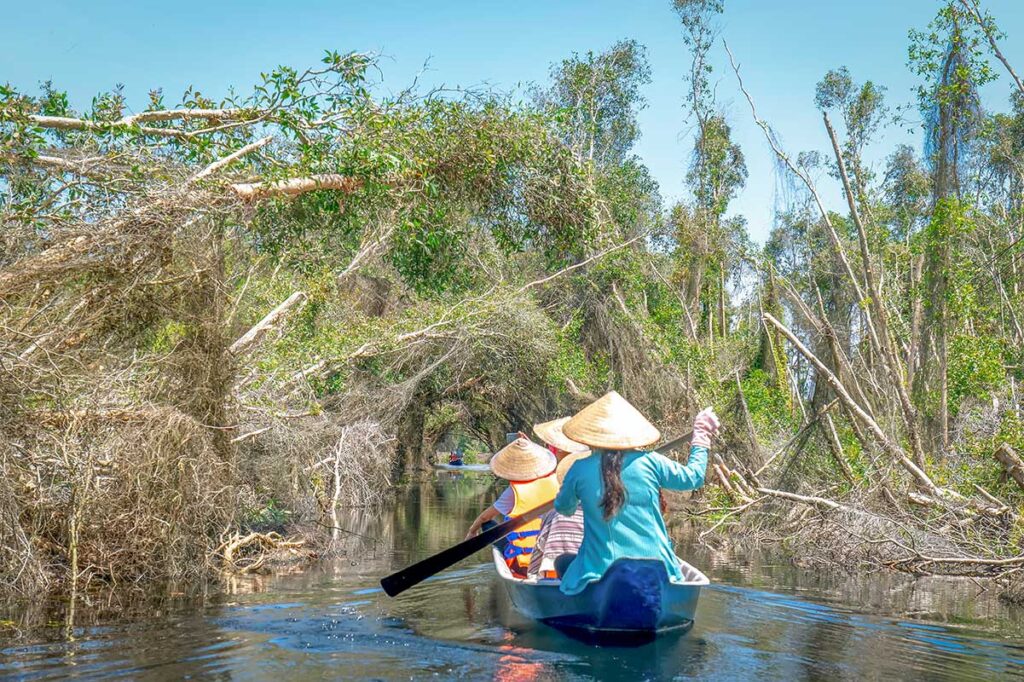
Expect around 30 minutes for the rowed or motorboat ride, and roughly an hour (sometimes a little more) for the cable-pulled version when it operates. Platforms can be wet, so non-slip shoes help, and it’s worth asking which boats are running before you queue.
2. 5-km melaleuca walkway
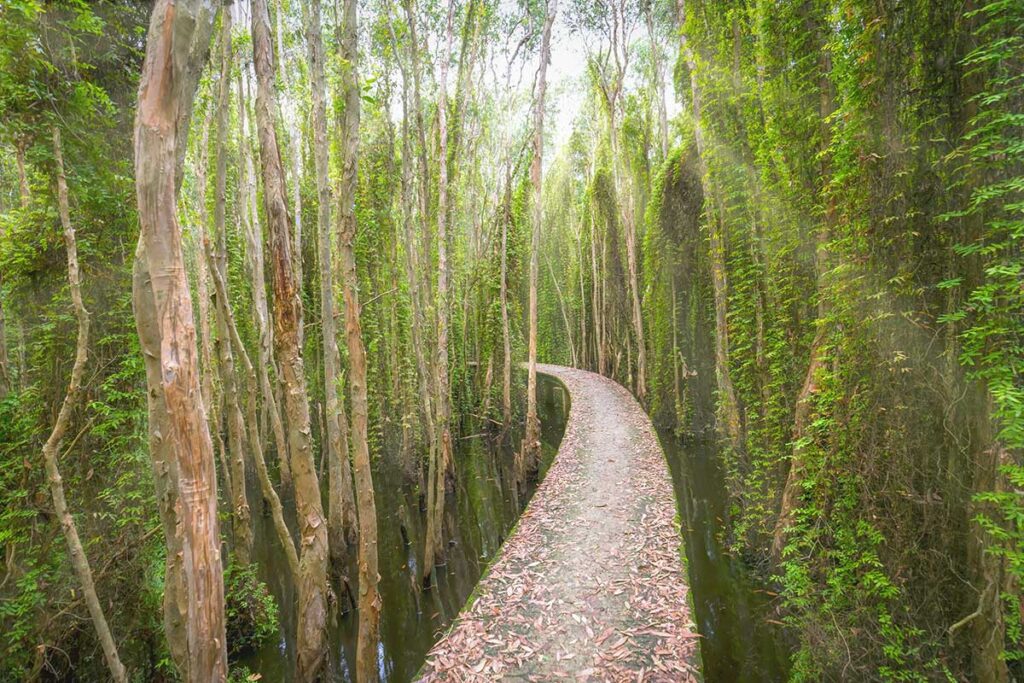
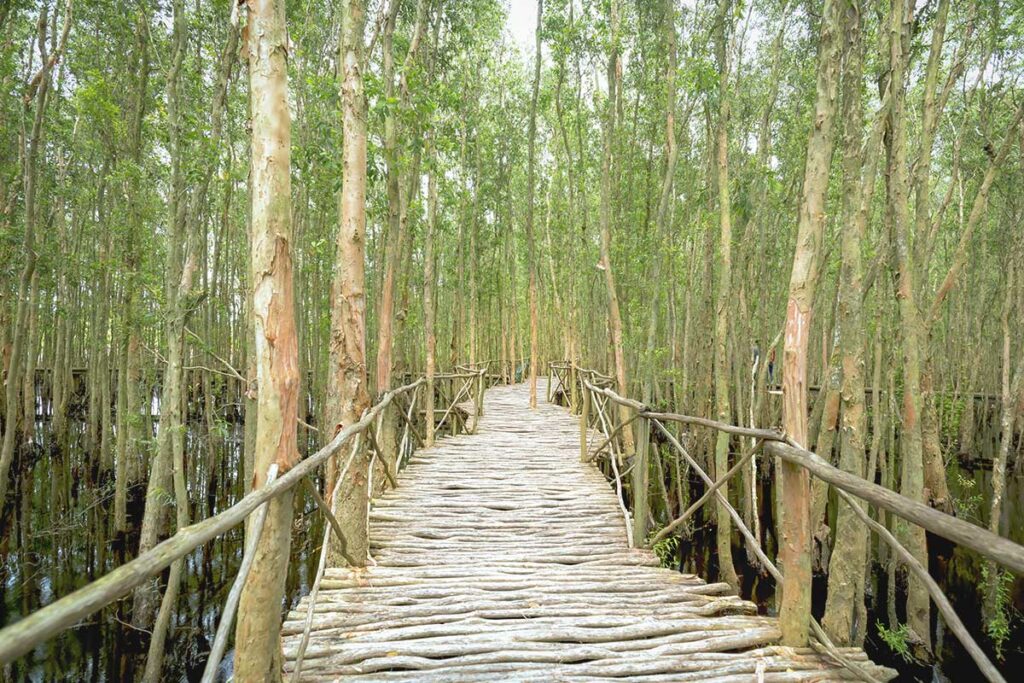
An easy concrete path loops through the forest with signed spurs to bridges and towers. Most people take 60–90 minutes at a relaxed pace, longer if you stop for photos. The look changes with the season: in flood months you get mirrored water under pale trunks; in the dry, the forest feels more open. Some stretches are sun-exposed—bring water—and surfaces turn slick after rain.
3. Observation towers (38 m + 18 m)
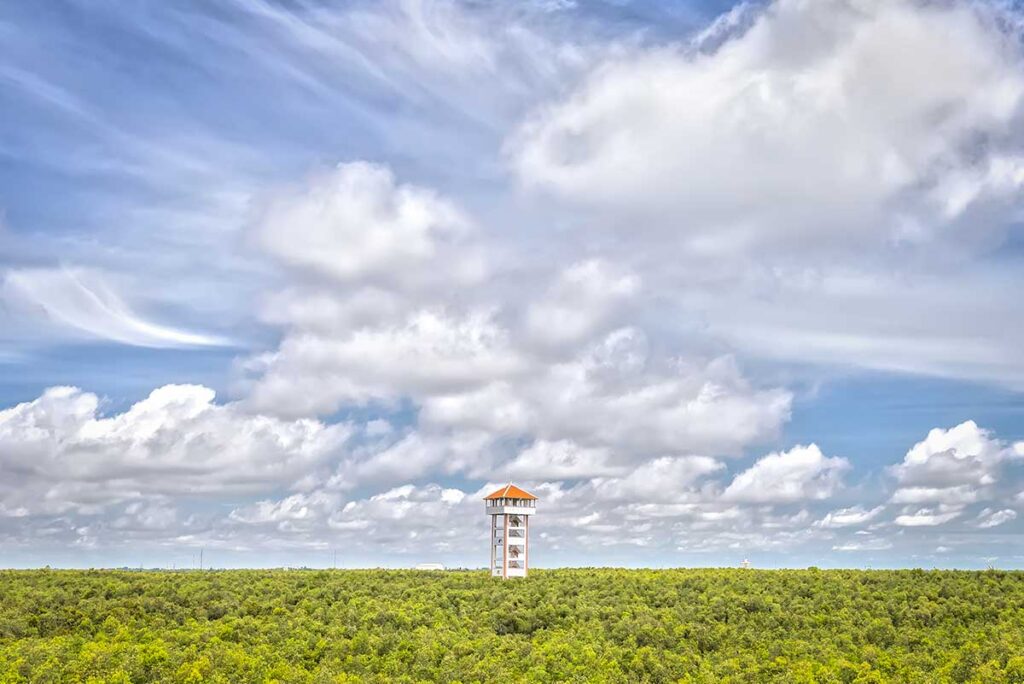
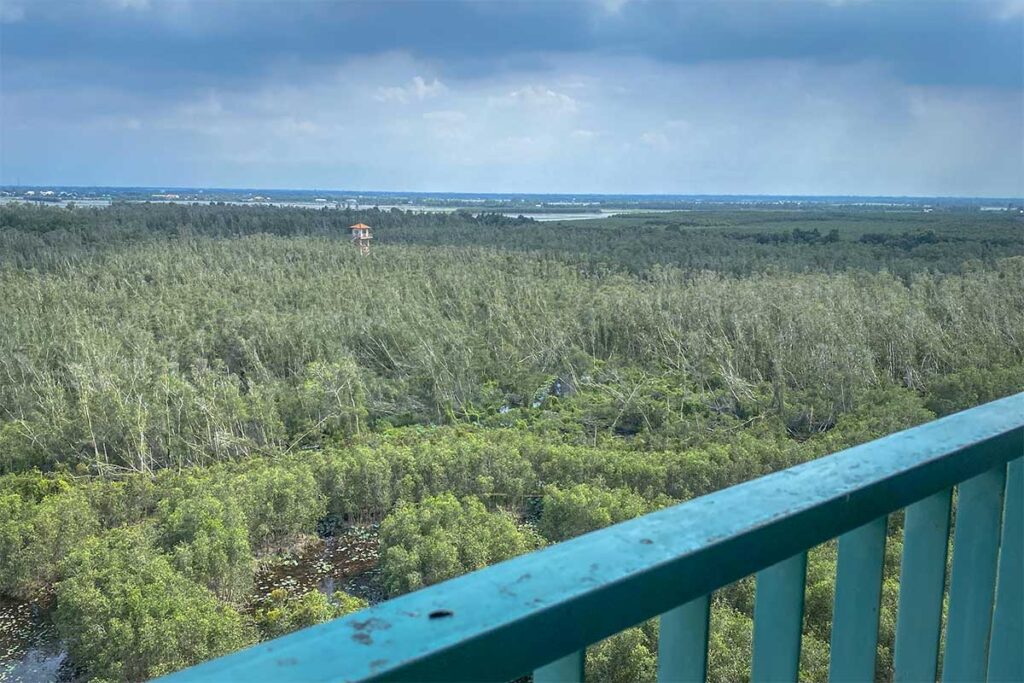
The two towers give the best overview of the reserve. In flood season you’ll see sheets of water dotted with lotus and lilies; outside that window you can look out to fields and treelines. Early morning offers softer light and clearer air; late afternoon is good for spotting bird movement. Stairs are steep and can feel hot at mid-day, and short waits at the top are normal on weekends.
4. X- and Y-shaped bridges over water-lily fields
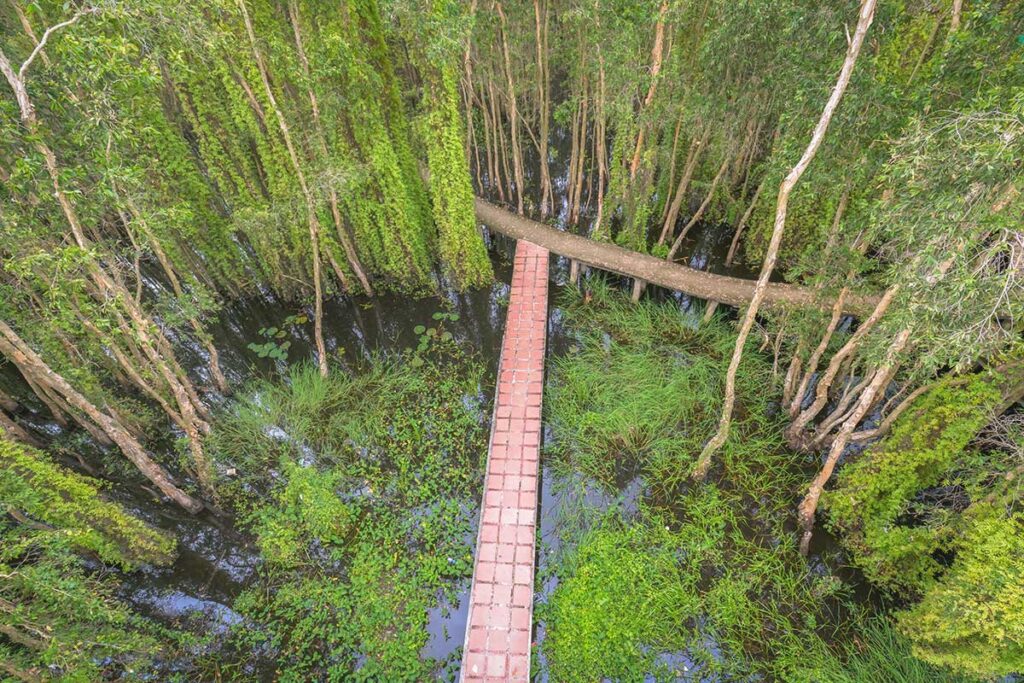
These geometric boardwalks are the park’s postcard spots. They sit over shallow ponds where lilies and lotus bloom most reliably in the morning—aim for roughly 7:00–9:00 if you want the flowers open. You can reach them via short detours off the main path or after a brief boat segment depending on what’s open. Handrails are low and the planks narrow in places, so watch your footing while you frame photos.
5. Crescent Lake (lotus & lilies)
Hidden deeper inside the trail network, this semicircular lake is a quiet stop when the water is high. Budget an extra 20–30 minutes to detour and take it in. It’s most photogenic during the flood season; at other times it’s calmer but still peaceful.
6. Birdlife & late-day roosting
Storks and cormorants often return to roost toward sunset. The upper levels of the towers or open sections of the walkway facing the treeline are the easiest viewing points. Keep voices low and skip drones near roosts; the birds spook easily.
7. Folk games & monkey bridges
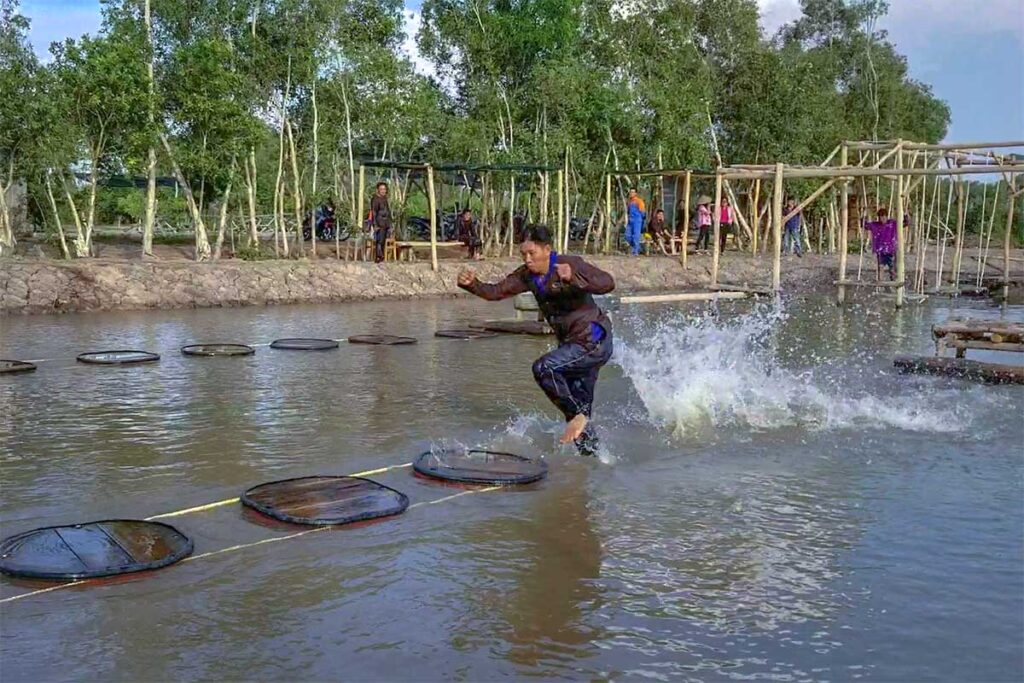
There’s a small activity corner with wobbling “monkey bridges,” balance beams, and casual fishing—more of a family diversion than a must-do. Skip it if the ground is slick or you’re unsteady on your feet.
8. Beekeeping corner & honey tasting
A quick stop shows basic apiculture with a chance to try a honey-lime drink. It’s a light add-on: pleasant if you’re curious, easy to pass if you’re short on time.
9. Nearby add-ons
If you want to round out the day, Phước Lộc Thọ Ancient Village displays traditional wooden houses and artifacts laid out like an open-air museum. Cánh Đồng Bất Tận (Infinite Field) offers longer, quiet boat lines through wetland grasses and is especially nice in late-day light.
Best time to visit Tan Lap Floating Village
Why timing matters
Tan Lap’s look changes with the water level. In the flood season, canals rise, melaleuca trunks stand in reflective water, and lotus/water lilies bloom (they open in the morning). In the dry months, paths feel more open, views from the towers stretch farther, and the experience leans more toward easy walking than boating. Your timing affects what you’ll see, which photos you’ll get, and even how long you’ll want to stay.
Peak months (late August–November)
This is the photogenic window most people imagine: higher water, greener canopy, and reliable lotus/lily scenes around the X– and Y-bridges and Crescent Lake. Boat rides feel more immersive and the park reads as a true wetland. Expect short showers, stronger sun between bursts, and mosquitoes—bring a light rain jacket and repellent. Aim to arrive early (flowers are freshest ~7:00–9:00).
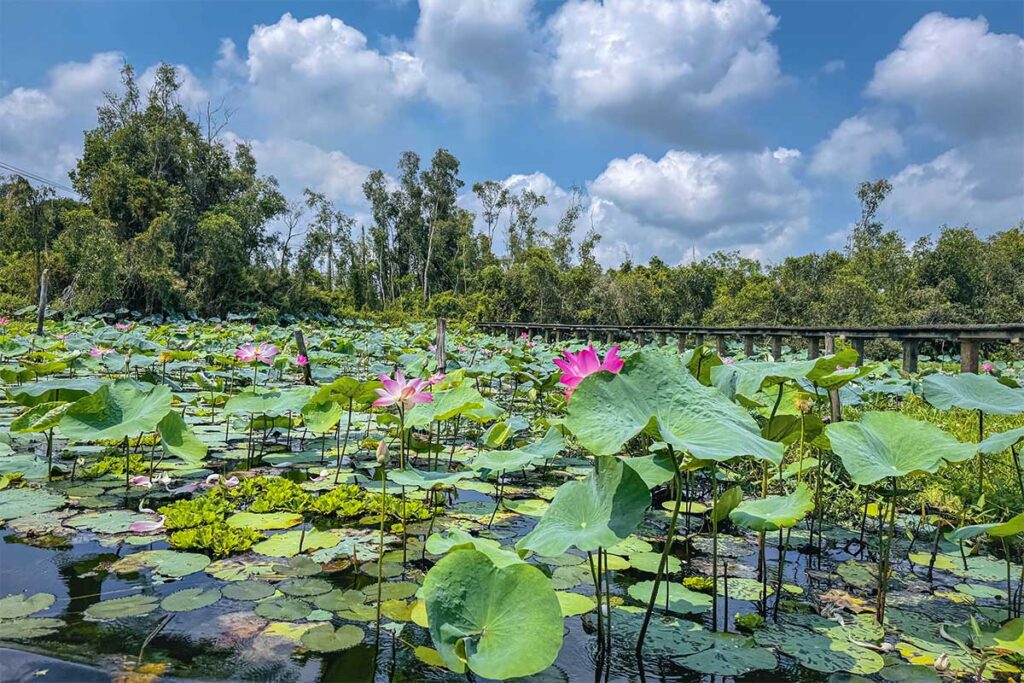
Good alternatives (December–January)
Water recedes but conditions are still pleasant. Skies are often clearer, temperatures easier, and the tower views can be excellent with longer sightlines toward fields. Lotus/lilies taper off, so it’s less about bloom photos and more about a calm walk and wide panoramas. Crowds are lighter than peak flood months.
Hot, dry months (February–April)
Scenery is at its simplest: fewer blooms and more exposed ground between trees. You can still enjoy the 5-km walkway and towers, but manage expectations if you’re chasing lily/lotus shots. Midday heat can be harsh—plan an early start or a late-day visit for softer light and a chance to see birds returning to roost.
Early rains & build-up (May–July)
Intermittent showers return and the landscape starts greening up. Not every pond is full yet, but the park feels more alive than the driest months. Walkways can be slippery after rain, and mosquitoes pick up again—non-slip shoes and repellent help. It’s a good time if you want fewer people and don’t mind changeable weather.
How to get there
Where is Tan Lap Floating Village
Tan Lap Floating Village (Vietnamese: Khu du lịch Làng Nổi Tân Lập) sits in Tân Lập Commune, Mộc Hóa District, Long An Province, along National Highway QL62. On Google Maps, search for the Vietnamese name or “Tan Lap Floating Village” and you’ll land at the main gate and pier. It’s roughly 100–110 km west of Ho Chi Minh City, but the drive often takes longer than the distance suggests.
Option 1: Day tour from Ho Chi Minh City
The simplest way is a door-to-door day tour. Typical itineraries run 10–12 hours with an early pick-up in HCMC, a boat ride through the melaleuca canals, the 5-km walkway and watchtower(s), plus a simple lunch. Some tours add Cánh Đồng Bất Tận (Infinite Field) or Phước Lộc Thọ Ancient Village in the afternoon, then return to HCMC before dinner.
Set expectations: this is a nature-focused day out with a relaxed pace; it won’t cover broader Mekong Delta culture like floating markets or homestays. Check what’s included (boat type, lunch, add-ons) and confirm the actual walking time so you can pack accordingly.
Option 2: By bus or limousine van (DIY)
Public transport is doable if you’re patient. From HCMC, go to Miền Tây or Chợ Lớn bus stations and ride to Tân An (Long An’s capital). From there, continue along QL62 toward Mộc Hóa by local bus or shared van, then hop off near the entrance and take a short taxi or xe ôm (motorbike taxi) if needed.
What to know: services thin out in the late afternoon, so plan your return connection before 15:30–16:00 to avoid getting stuck. Build buffer time for transfers, and have a ride-hailing app or a local taxi number saved for the last leg.
Option 3: Your own transportation
Private car with driver is the smoothest option for families, photographers, or anyone who wants control over timing (arrive for 7:00–9:00 flower bloom, linger for late-day birdlife). You’ll also avoid waiting for buses and can add nearby stops easily.
Self-drive motorbike works for experienced riders. Two common routes:
- Route A: HCMC → QL1A to Tân An → left onto QL62 straight to Tân Lập.
- Route B: HCMC → Provincial Road 10 to Đức Hòa → N2 → join QL62.
Expect mixed surfaces and occasional rough patches on QL62; slow down for construction or potholes. In the wet season, bring rain gear and ride defensively—roads can be slick, and truck traffic kicks up spray. Parking at the site is straightforward; there’s usually a small fee. Starting early makes the ride cooler, traffic lighter, and the on-site experience better.
Practical visiting information & tips
Opening hours & ticketing
Hours (typical): 07:00–17:00. Last boats usually run ~15:30–16:30. If you arrive late, you may only have time for the walkway/tower.
How tickets work: Buy entrance at the gate; add a boat option at the pier (rowed sampan or motorboat; a cable-pulled boat runs only when scheduled). Combo tickets appear on busy days/holidays (entrance + short boat + lunch).
Typical prices (for orientation only):
- Entrance: ~60,000–85,000 VND
- Rowed/motorboat (short ride): ~30,000–90,000 VND
- Combos: ~200,000–300,000 VND
Prices and offerings change with season and holidays, so confirm at the gate.
Tours: Most visitors go on a day tour from Ho Chi Minh City—these usually include transfers, entrance, a boat ride, lunch, and basic guiding. If you’re on a tour, you typically won’t buy separate tickets on site.
Time of day
Early morning is best for cooler temps and lotus/water-lily blooms (≈07:00–09:00). Late afternoon brings softer light and a chance to see birds returning to roost from the towers. Mid-day is hottest and flattest for photos—save the towers or shaded boat ride for then.
Facilities & on-site services
Expect a ticket gate, pier, restrooms, small kiosks, and a simple restaurant/canteen. There’s paid parking at the entrance. Accommodation exists but is limited and status can change—see below if you’re considering a night.
Accessibility & conditions
The 5-km walkway is flat concrete but long; towers have steep stairs; some bridges are narrow. Surfaces get slippery after rain and when boarding boats. Sections may close for maintenance. Overall it’s not wheelchair-friendly and can be challenging for limited mobility.
What to bring
Non-slip footwear, sun protection, light rain jacket in wet months, mosquito repellent, water, and cash for small purchases. A wide-angle lens is handy for the X/Y bridges and tower views; a dry bag is useful on boats.
Safety & etiquette
Wear life jackets on boats and follow staff instructions. Stay on marked paths and don’t climb railings for photos. Keep noise low near bird areas; avoid drones around roosts. Don’t pick lotus or lilies. Pack out trash where bins are scarce.
Staying overnight (tower hotel & entrance-area rooms)
There’s a hotel inside the forest tower plus simpler rooms near the entrance. The setting is undeniably scenic and very quiet at night, which some travelers love.
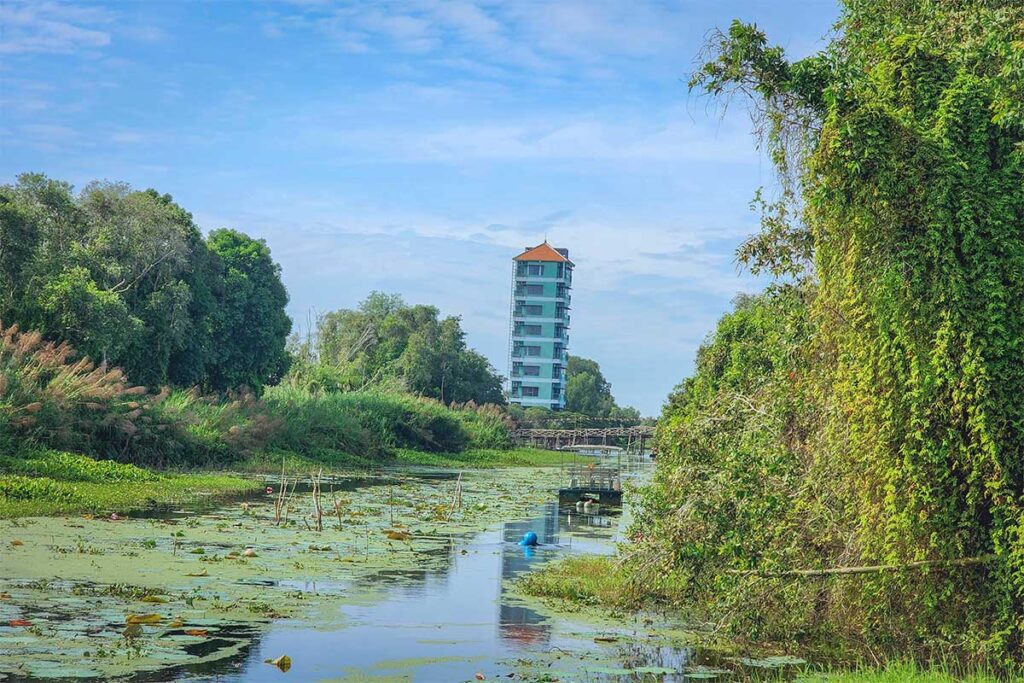
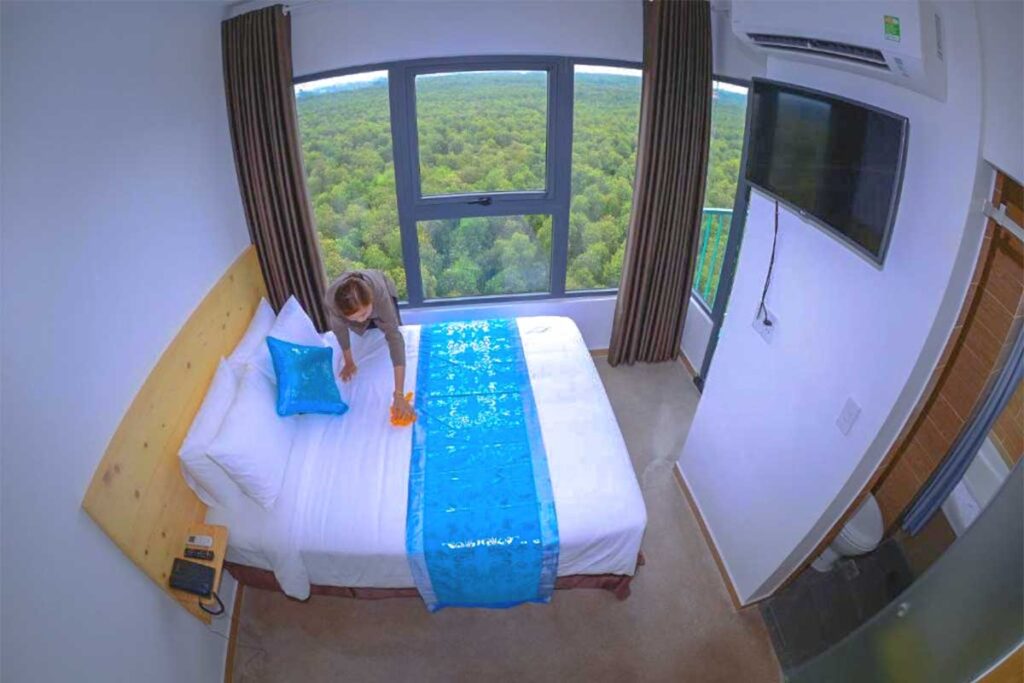
That said, manage expectations:
- Rooms are basic and parts of the complex feel dated; in places you can see the need for maintenance (peeling paint, tired public areas).
- Mosquitoes are intense around the swamp—bring strong repellent and long sleeves for dusk/dawn.
- Logistics: The tower hotel sits about 1 km from the breakfast/restaurant area, which is odd if you don’t want a long morning walk.
- Service & booking: Staff are generally friendly, but English can be limited and third-party bookings sometimes require patience to sort on arrival.
- Food: Dinner menus are very Vietnamese (which many enjoy); breakfast is simple.
- Value: Some guests feel price vs. quality is on the high side given the wear and tear.
Bottom line: Stay one night only if you’re specifically after the novelty of sleeping in the wetlands and a dawn walk to the towers. Otherwise, visit as a day trip or sleep in Tân An/Kiến Tường where options are more straightforward.
Is Tan Lap Floating Village worth visiting?
Short answer: yes—if you want a calm, nature-first day out of Saigon and you’re fine with a curated eco-park rather than a deep dive into Mekong culture.
What’s good: the melaleuca scenery is classic Southern Vietnam, the mix of boat + 5-km walkway + watchtowers keeps the day varied, and the X/Y bridges are genuinely photogenic in the morning bloom window. Costs are reasonable by Vietnam standards, and it’s easy to navigate even if you don’t speak Vietnamese.
Trade-offs: the 2.5–3.5 hours each way can feel long for what is, in the end, a managed park. This isn’t a “floating village” with daily river life; it’s a wetland reserve set up for visitors. Some infrastructure looks dated or goes through on-off renovations, and the experience is seasonal—flood months (roughly late Aug–Nov) look best; late dry season is simpler.
Who will love it: travelers who enjoy quiet nature, light walking, and easy photography; families wanting a low-effort green escape; anyone curious about cajuput wetlands without committing to a multi-day Delta loop.
Who should pick something else: if your priority is Mekong culture—floating markets at dawn, homestays, river villages—choose a broader Delta itinerary (e.g., Cần Thơ with Cai Rang, or a Ben Tre/Vinh Long homestay). If you dislike managed attractions or long transfers for gentle activities, your time may be better spent elsewhere.
